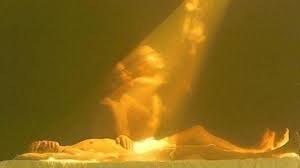God Exists – I Can Prove It! Pt. 2

In my last blog post, we pretty much nailed the idea that the universe has a beginning. And if it has a beginning, it must have a Beginner who is omnipotent.
In a recent discussion with an atheist, however, I got an interesting retort at this point:
Just because there was a “beginning” of this universe of ours, does not mean there could not have been other universes before ours. Moreover, how do you know there are not parallel universes to ours and that ours came from one or more of them? Or, how do you know the universe doesn’t exist eternally through unlimited numbers of “big bangs?” Perhaps the universe simply expands and contracts over and over again. And why do you claim it to require “infinite power” to create something from nothing? You make no sense!
Here we go!
Science vs. Science Fiction
Let’s take these one at a time. With regard to it requiring infinite power to create something from nothing, let me use an analogy: Imagine that you happened upon two construction sites where houses were to be built. One of them had nothing there but piles of concrete mix, drywall, bricks, windows, doors, wire, etc. while the other already had a foundation laid, the walls, roof, and even some doors up and attached, but was still not complete. Which house would require more power or more effort to construct?
This is not a trick question.
The first house has less actuality and more potentiality; thus, it would require more power to actualize, to use philosophical terms. The more potency, the more power required to actualize that potency.
Well, now let’s imagine we have absolutely nothing to work with to bring a house into being. This would require infinite power because we would be considering infinite potency and zero actuality. Infinite potency would require infinite power. So how much power is required to create the universe ex nihilo, or from nothing? Infinite power.
As far as my friend’s other points are concerned, I think we are now traversing away from science and into the realm of science fiction. Physicists have generally discounted the expanding and contracting universe theory now that they have calculated in rough terms (certainly far from exact) what would be the size and density of the entire universe. Many scientists have thus concluded there is simply not enough density in the universe—even if you add so-called “dark matter” to the equation—for the universe to contract. Let me explain.
If you were to set off a large firecracker here on good ole’ terra firma, the paper in which the explosives would be wrapped would fly upward due to the concussion of the explosion. Then, that same paper would float back down to the earth. Why? Because there is a massive and dense object called “the earth” beneath it that generates a gravitational force strong enough to pull those objects back down to earth. The truth is, there is simply not enough density in the roughly 100 billion galaxies in the universe that could generate a force strong enough to pull all of those galaxies back together to cause another “big bang.” Moreover, physicists tell us that the laws of thermodynamics would still apply to an expanding and contracting universe. It would still run out of usable energy in time. And the increasing entropy still implies a beginning—ultimately. No matter how you slice it, science and scientists seem to be telling us there really was a “beginning!”
Multiverse Theory
As far the idea of multiple or even infinite universes goes, we can put this in the same category as so-called “string theory”—or theories—involving multiple dimensions and/or multiple universes; they ultimately only move the question of the first cause back a notch. Notwithstanding the fact that we are really in the realm of philosophy here and not science, because these theories are not scientifically falsifiable, there is, at best, no scientific evidence for any of these dimensions or universes. And even if there were evidence in favor of any of these theories, none of them can answer the ultimate question of the cause of all of these so-called universes or dimensions. And so it goes.
Back to Philosophy
But let us now leave the rarified atmosphere of science and come back to philosophy because there is a crucial point we need to make clear. Whether we are speaking of motion, cause, or being, it would be absurd to attempt to posit an infinite succession of finite movers, causes, or beings without the classic “unmoved mover,” “uncaused cause,” or “necessary being”—God—because that would be like positing an infinite number of cars on a train none of which having the power to move the train itself. Whether your infinite movers are labeled as simply matter, parallel dimensions, or expanding and contracting universes, there has to be a first mover—the engine, if you will—in order to explain it all.
Making Another Motion
Often, in conversation with atheists at this point in the discussion, you will hit a wall with regard to the concept of “unmoved mover.” Yet, this concept is absolutely crucial. The objection will come in words to the effect of: “How do you know your ‘first mover’ was not moved? Isn’t this denying the scientific laws of motion? If it is ‘moving’ it had to be moved!”
The answer is simple, but quite profound. If the “first mover” or “unmoved mover” were moving, or moved, it could not be the unmoved mover. It could not explain the existence of motion. That’s the point!
At this point in the conversation it becomes imperative to introduce some language with which many in the modern world will not be familiar. When we speak of the “unmoved mover,” it would logically have to be what philosophers call pure act. In order to understand this, we need to examine the concept of “motion” for a moment. If we look at the motion of any object in the universe, we say that it (or “he” if we were going to consider the motion of living beings) must first have the “potency” or “potential” to the kind of motion being considered. Then, that “potency” must be actualized or “reduced to act” as philosophers say, by another already actualized in this particular kind of motion we would be considering. This is Newton in philosophical terms.
Some may interject at this point, “I don’t have to be moved by anyone in order for me to move from here to there. I can move myself. What are you talking about?” And that is true. One of the defining characteristics of all living things is that they are capable of “immanent action,” which means they act “from within” as a whole being. We acknowledge that. But we are now speaking of ultimate motion, i.e., how all of creation was moved in the first place.
To make this as clear as we can, let’s consider “you” for a moment. Yes, you can move yourself. But you are not the explanation for your “first” motion. Your parents, for example, were the two “movers” who first “moved” you, so to speak, but they were not the absolute first mover because they themselves were “moved.” And as I said before, there cannot be infinite movers none of which being the “first mover,” because that would be absurd. And here’s the key: The “first mover,” would logically have to be “unmoved,” yet the source of all motion. Otherwise, motion itself simply could not be. What does that old song say? “Nothing from nothing leaves nothing…”
Moving Forward
Now, let’s move this argument forward… Get it? Move the argument…
A poor attempt at philosophical humor, I know.
Anyway, once we see that the first mover must be necessarily “unmoved,” as I’ve demonstrated, it follows there would be no “potency” to motion in the unmoved mover. “He,” or “it” would be what philosophers refer to as pure act. It could not “move” from here to there because it would already be “there.” It would be omnipresent.
This “unmoved mover” could not then be comprised of matter. Matter is, by definition, measurable and finite—movable. By its very nature, matter possesses the potential, or “potency” for change. Thus, the unmoved mover would be of necessity immaterial. We call that “spirit.”
Moreover, the unmoved mover could not be comprised of parts, and it could not be finite. “Parts,” like matter, would necessarily have potency. And even a pure spirit (like angels) that is finite would necessarily have potency–the potential to move, learn, grow, etc. That which has potency cannot be the first mover.
So what can we conclude of the first, or “unmoved,” mover! It would have to be “spirit,” or not composed of matter. And it would have to pure actuality with no potency whatsoever.
But what does that mean?
There could be nothing that is not a logical contradiction that the unmoved mover would not be able to do. It would be all-powerful. If it lacked power, it would have the “potential” to grow in power.
It would not be able to come to know anything. Why? Because it would already know everything that is knowable. If it lacked in knowledge, it would have the potential to grow in knowledge.
So, guess what? We have now demonstrated the unmoved mover must be rational. “It” must possess rationality. So “it” is now a “he.” We’ll come back to this point in a moment.
Uncaused Cause
Let’s now consider the idea of the “uncaused cause.” “It” would have to be eternal. Think about it. If it is “uncaused” that means it has no beginning. It would be eternal as well as the cause of all that is.
Some may object at this point. “Just because this ‘uncaused cause’ may have been eternal in the past, doesn’t mean it would still exist!”
Actually, it does. To have no beginning is to be outside of time and change. It would be impossible for an eternal being to move from being to non-being because an eternal being is changeless. Death requires movement from being to non-being that would be impossible for an eternal being. And this leads us to our next point…
Considering the Nature of Being
St. Thomas’s third proof for the existence of God is from contingent and necessary being. When we speak of “the unmoved mover,” and “the uncaused cause,” the problem folks have conceptually is they are thinking in terms of this ultimate being as just a larger version of a human being. We are not. In this third proof, we see this distinction a bit more clearly. When we speak of “the necessary being” of Thomas’s third proof, we are not speaking of just another being among beings. We are considering “being” itself.
If you recall from my last post, we’ve already established that every single thing and every being in the universe is contingent. Everything we see could either be or not be because everything we see has received its being from another. Because of this fact, nothing in the universe can explain its own being as well as being itself. There must be a being, then, that did not receive its being from another. It would simply be being itself—infinite being. This is the definition of the necessary being. In fact, it would not even be proper to refer to it as “a” being, technically speaking. It is being itself. Everything else that exists would merely participate in what “it” possesses infinitely!
As an aside here, I find it fascinating that God revealed his name to Moses as “I AM” in Exodus 3:14. Names, in ancient Hebrew culture, revealed something about the ontology of the one named. God appears to have revealed himself to Moses as this ultimate and infinite being which I have just demonstrated must actually exist.
Objection!
The next objection that often comes is to say something like this: “I can see how there would have to be a being that did not receive its being from another, but my question is: why would this first being have to be infinite?”
Even though I’ve already demonstrated this to be true, I find this point needs to be hammered home over and over before it sinks in. So at this point I approach it from yet another angle that seems to be helpful for some.
Let’s consider what we can know about being itself. Think about this. Here in my hand, I am holding an acorn. This acorn has the potential of becoming an oak tree. Does the oak tree that this acorn has the potential of becoming actually exist? Of course not! That almost goes without saying. Well, doesn’t it follow logically that being, considered in and of itself, is actual? There is no potency when we consider being per se. Inasmuch as there is potential, we are no longer considering being itself in an absolute sense. If you are considering as the first being, a being that has potency, e.g., the potential to be or not be, to move, grow, learn, etc., then you are no longer speaking of the first and necessary being. The first and necessary being would be by definition infinite being and in a category all by itself.
The Pantheism Problem
At this point an astute interlocutor will often say this sounds like pantheism. If being has to be actual without potency, then wouldn’t I then meet the definition of God as “pure act” and no potency? I exist, right? Even more, wouldn’t everything that exists then be “pure act?” Am I saying here that “everything is God?”
The answer is no, I’m not.
I can eliminate me and every other thing and being in the universe as being “God” precisely because everything we see has potency and is subject to change. Inasmuch as they are actual, all things and beings we encounter do exist, but they would not qualify to be the first and necessary being because they each possess both actuality, inasmuch as they exist, and potency, inasmuch as they have the “potential” to motion, growth, learning, etc. Thus, we can conclude that every “thing” we encounter in our universe participates in being, but none of these “things” qualify to be being itself. Being itself, or what St. Thomas would call the necessary being, would be infinite being, pure act, without even the possibility of either lack of any perfection or the slightest change. This is a basic definition of God.
May the Force be with You
“What a minute,” someone might object. “Even if I acknowledge there must be a first mover, a first cause or first being, we are a long way from saying there’s a God. Maybe this ‘first mover’ you speak about was a space alien from another Galaxy, or perhaps an impersonal force like we see in Star Wars. Further, if this ‘first mover’ is the cause of all motion, it would have to be in motion itself. You yourself quoted Newton who said every object in motion must be acted upon by another object itself in motion. Well, then, your so-called ‘first mover’ would have had to have been in motion; and therefore, placed in motion, anyway. You’ve answered nothing.”
Perhaps the problem here is we live in a culture that watches too many science fiction movies! To attempt to say the first mover was ET only moves the question back without really addressing the question at all. That’s a cop out! And remember, the “unmoved mover” cannot be in motion, because if it, or he, were in motion, it, or he, would not be the first mover; and therefore, it could not explain motion itself. The first mover cannot be in motion.
Expanding Motion
It might help at this point to expand our discussion of “the unmoved mover,” and what we mean by motion, and then we’ll move on to one final idea to consider.
When we speak of motion we are not only speaking of physical motion, but all motion. Let’s first consider the physical motion of inanimate objects once again. As I said before, in order for an object to be moved it must first have the potential or potency to motion. However, that potency only becomes actualized, or it only moves from potency to act when it is acted upon by another object that is already in motion, or in act. Now we want to consider this: the same could be said for spiritual or intellectual motion. In order for a rational being to come to know truth, he must be acted upon by a being who has already actualized that truth. The one who is to come to know truth must first have the potential to know and then that potency must be moved into actuality. This necessary, first “Unmoved Mover” of which we have been speaking, then, could not be just some inanimate object or “force.” It could not have any potency whatsoever with regard to intellectual motion, as well as physical motion. It would be necessarily both omnipresent and omniscient. We could add to the equation as well any potency with regard to power. Thus, it would also be omnipotent. Thus, we have, once again, demonstrated the Unmoved Mover to be omniscient, and therefore rational, as well as omnipresent and omnipotent. In fact, I think we are safe now to refer to “him” as “God,” because we have just given the classic definition of the term!
Thomas’s Fourth and Fifth
Thomas’s first three proofs for the existence of God seem the most compelling. In fact, St. Thomas considered his first proof the “most manifest” way of proving God’s existence. And I agree with him. But his fourth and fifth ways of demonstrating God’s existence seem easier to grasp by most people. I am going to combine them as one unified proof.
Here goes.
We see all around us in the universe things and beings possessing various levels of perfection they did not give to themselves that are ordered toward ends they did not devise themselves. There must of necessity be absolute and infinite perfection and order, or reason, in order to explain the existence of these levels of perfection and order. Indeed, I argue that any person who honestly investigates the nature of the material universe discovers mathematical precision and reason to the universe that necessarily means the first cause of this universe would have to be rational. Thus, we find yet another reason we can conclude God is not a force; “he” would be a person. Indeed, by revelation in Scripture and Tradition, we believe he is three persons. But we’ll leave that for another time, and another discussion!
The bottom line here is this: the incredible complexity and order we discover in nature demands not only an intelligent first cause, but a first cause who is omniscient, omnipotent and omnipresent!
What’s Love Got To Do With It?
For many who come to the existence of God through reason there can be a tendency to reduce the God they discover to an impersonal force, or a deistic God that has nothing to do with us. To say this “God” actually “loves” us would be ludicrous.
In the New Testament, God has revealed himself to be love in the eternal relations subsisting within the inner life of God. Father, Son, and Holy Spirit pour themselves out into one another in an infinite and singular act of love! But that requires accepting the gift of faith and believing in the revelation that our Lord communicated to us 2,000 years ago. Can we get at this God of love apart from that revelation?
Certainly, we cannot arrive at God as Trinity apart from revelation. And so, God as “love” revealed in a Trinitarian fashion is impossible without revelation. But I would argue there is a hint of God’s essence being love by examining what God has done in creation.
My final thought: Scientists tell us the “Big Bang” (creation) occurred ca. 13.7 billion years ago. If God created the universe 13.7 billion years ago, can’t we ask the question, why didn’t he do it 10 billion years ago? Why not 2 billion, 100 thousand or five years ago? The implication here is that God was “free” to create when he did. There is not reason to consider the creation as something the Creator had to do.
We can also ask the question, “Why?” Why would an infinite being create something that could not add anything to himself? He is infinite and perfect being!
What is the definition of “love?” St. Thomas Aquinas defines it as “willing the good of the other,” and I would add, “without expecting anything in return.” That is what love is. And that is precisely what God did in creating the universe. He created it for its sake without expecting anything in return. Seems like love to me.
I know we need revelation for this last, but if we add to this the Christian notion that God knew from all eternity not only that his creation could add nothing to him, but that one day his creation would kill him, this is a kind of love that is mind-blowing.
That’s for another time to consider.
If you enjoyed this, you’ll want to click here for more.





